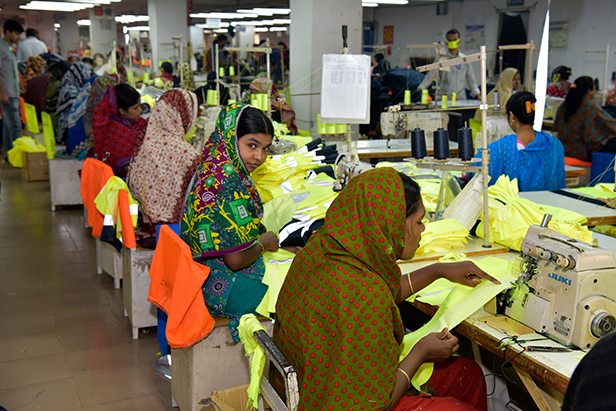News April 02, 2020
COVID-19 Spurs Mass Layoffs at Garment Factories
The coronavirus’ brutal economic impact on western apparel wholesalers and retailers is fueling mass layoffs and putting factories on the brink in countries like Bangladesh.
Garment factories and their workers in Asian nations that manufacture clothing for Western companies are facing economic ruin as apparel retailers and wholesalers in North America and Europe cancel or halt ordering due to the novel coronavirus causing a drastic decline in demand from consumers and end-buyers.
Workers in Bangladesh, Cambodia, Myanmar, India, Vietnam, Cambodia and other developing nations with similarly constituted apparel production sectors are seeing – and could likely continue to see – large-scale layoffs and furloughs, as well as factory closures, studies and media reports indicate.

Workers at a garment factory in Bangladesh
“Our situation is apocalyptic,” Rubana Huq, president of the Bangladesh Garment Manufacturers and Exporters Association (BGMEA), which represents Bangladeshi factory owners, told The New York Times. “The cancellations and hold instructions coming in from Western fashion retailers are pushing us to the point of insolvency, with massive open capacity and raw materials liabilities.”
Before COVID-19 struck, Bangladesh’s garment sector employed about 4.1 million. But as the coronavirus crisis has deepened, more than one million of those garment workers have already been fired or furloughed as a result of order cancellations, according to a study from the Penn State Center For Global Workers’ Rights and the Workers Rights Consortium. Huq told The New York Times that $2.8 billion dollars worth of orders have already been canceled or put on hold. Some 84% of Bangladesh’s exports are ready-made garments. That’s $40 billion. The cancellations and postponements could put as many as 2 million garment laborers out of work.
Meanwhile, an estimated 20,000 workers in Myanmar, which has a smaller apparel sector than Bangladesh, have already lost their jobs; as many as 70,000 could be let go by the second week of April, according to Human Rights Watch. Meanwhile, projections have it that 200,000 garment workers in Cambodia could soon be out of work, Human Rights Watch reported.
COVID-19 Puts Millions of Global Supply Chain Workers at Risk https://t.co/G8BcRJLC5E
— Human Rights Watch (@hrw) April 2, 2020
The problems for these nations’ garment industries began in January and February as it became more difficult to source raw materials from factories in China. That sourcing difficulty reared because lockdown measures in China aimed at slowing COVID-19’s spread hobbled China’s manufacturing and exporting capabilities.
Still, the situation for the garment workers in Bangladesh and elsewhere worsened rapidly in March as similar shutdown measures put a chokehold on western economies, forcing retail stores to close and demand from retailers and wholesales to drop off a shelf. That led to the surge in cancellations and a stop in further ordering.
According to the Penn State study, Bangladesh garment factories reported that following cancellations 72.1% of buyers refused to pay for raw materials (fabric, etc.) already purchased by the supplier. Similarly, 91.3% of buyers refused to pay for the cut-make-trim cost (production cost). “This is despite the fact that buyers have a contractual obligation to pay for these orders,” the report asserted.
Even so, as Quartz noted, it might not be that straightforward. Purchase orders typically contain clauses referred to as force majeure that release brands/companies from their contractual duties in exceptional circumstances. Regardless of legalities, the reality is that the order cancellations without pay contributed to 58% of Bangladesh factories surveyed in the Penn State study to report that they’ve had to shutdown most or all of their operations.
Relatedly, the Penn State Center For Global Workers' Rights study further reported that of the 316 Bangladeshi suppliers who took the survey, suppliers said that more than 95% of brands and retailers refused to contribute to the cost of partial wages for workers who were temporarily suspended or severance payments for those dismissed.
“These are extraordinarily challenging times, yet clothing brands facing tough business decisions to ride out the COVID-19 crisis should not forsake the factory workers who make their branded products,” said Aruna Kashyap, senior counsel in the women’s rights division of Human Rights Watch. “Brands should take steps to minimize the devastating economic consequences for garment workers in their global supply chains and for their families who depend on this income to survive.”
Some brands, such as fast-fashion retailer H&M and Spain-based Inditex (which owns retailer Zara), pledged that they will fill contractual obligations to pay for merchandise already in production. “We will of course pay for these goods and we will do it under agreed payment terms,” a company spokesperson said in a statement. “This is in accordance with our responsible purchasing practices and not only the case in Bangladesh, but in all production countries.”
Other companies/brands have indicated that their own financial situations are so dire that they had no choice but to cancel orders. A spokesperson for Primark, a fast-fashion retailer based in Dublin told Quartz: “Every store in every country in which we operate is now closed. We are losing sales of (more than $800 million) a month as a result. We have therefore been left with no option. We have large quantities of existing stock in our stores, our depots and in transit that is paid for. If we had not taken this action, we would be taking delivery of stock that we simply could not sell. This has been unprecedented action for unprecedented and frankly unimaginable times.”
For sure, the economic pain tied to the coronavirus is being felt acutely in the West, too. During the final two weeks of March, more than 10 million Americans filed for unemployment, smashing previous records for filings. In the North American and European promotional products industries, mass layoffs, temporary closures, and precipitous drops in revenue have become the norm – a phenomenon that’s occurring in many industries. Manufacturing in the U.S. – and the world – contracted in March.
